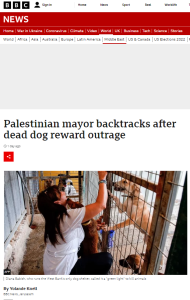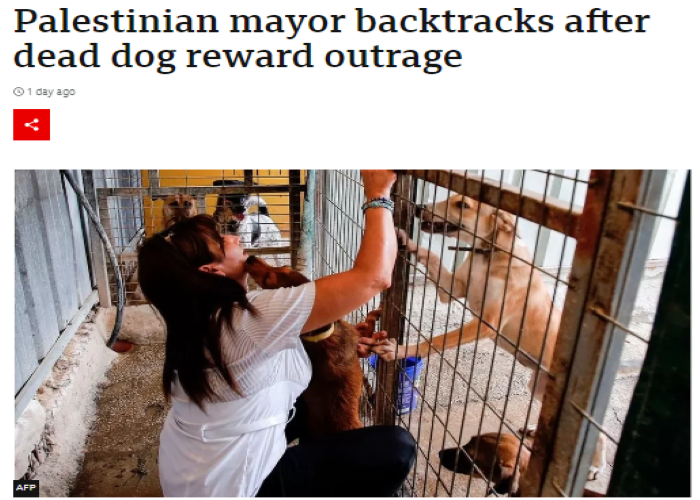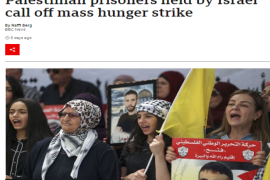On the afternoon of November 11th the BBC News website published a report by the Jerusalem bureau’s Yolande Knell concerning a story that was already a week old.
Headlined ‘Palestinian mayor backtracks after dead dog reward outrage’, the report informs readers that:
“A Palestinian mayor whose offer of a bounty for killing stray dogs caused outrage among animal-lovers has backtracked, saying he was joking.
Hebron Mayor Tayseer Abu Sneineh had said those who killed strays in his city could get 20 shekels ($5.8; 5.7 euros) per dog.
Stills and videos were then widely shared on social media which apparently showed dogs being killed or abused.”
Although this is clearly a story about internal Palestinian affairs, readers are told that:
“Sometimes, strays […] gather in large packs and scavenge for food. Some can become aggressive and there are frequent complaints to Palestinian councils who often poison and shoot the dogs.
With most of the occupied West Bank under full Israeli military and administrative control, there is no joined-up strategy for dealing with the problem.” [emphasis added]
Later in the report readers find a predictable reference to “the cash-strapped Palestinian Authority” with no explanation of the fact that the PA prioritises salaries for terrorists.
“Palestinian animal rights activists say that the only silver lining of recent days is that it has opened an overdue debate on compassion towards animals.
While there is little financial support from the cash-strapped Palestinian Authority, they stress the need for a comprehensive neutering and vaccination programme.”
Knell notes the coverage of the story in the local media:
“After days of furore – with attention from Palestinian and Israeli media – and meetings with animal rights groups, Mr Abu Sneinah told the BBC that there had been “overreaction” to his comment on the dogs which he now says was meant “as a joke to highlight the problem”.”
Indeed Israeli English language media outlets such as Ynet, the Times of Israel, i24 and the Jerusalem Post had covered the story, with all of them noting an aspect of the Fatah affiliated Hebron mayor’s record:
“Abu Sneineh was one of four Palestinian terrorists who on May 2, 1980 attacked a group of Israelis and Jews in a Hebron alley, firing and hurling grenades at them. The attack killed US citizens Tzvi Glatt and Eli HaZe’ev, Canadian Shmuel Marmelstein and Israelis Hanan Krauthammer, Gershon Klein and Ya’akov Zimmerman. Another 20 people were injured in the attack.
The four terrorists were all sentenced to life in prison, but were released in prisoner exchanges later in the decade.”
As documented here in 2017, the BBC did not find the election of a convicted terrorist to the post of mayor of Hebron newsworthy at the time and so it is perhaps not surprising that Yolande Knell chose not to include that information in her belated report on this week-old story. That omission once again highlights the corporation’s level of commitment to informing its audiences about internal Palestinian affairs.
Related Articles:
BBC STAYS MUM ON CONVICTED TERRORIST’S SUCCESS IN PA ELECTION
BBC’S PREFERRED TERMINOLOGY HINDERS AUDIENCE UNDERSTANDING
CRICKETS, NO BARKS: MEDIA SILENT ON HEBRON MAYOR’S BOUNTY FOR SLAUGHTERED DOGS (CAMERA)






Every dog has its day provided it gives Hebron a wide berth. The people who run that place are already barking!